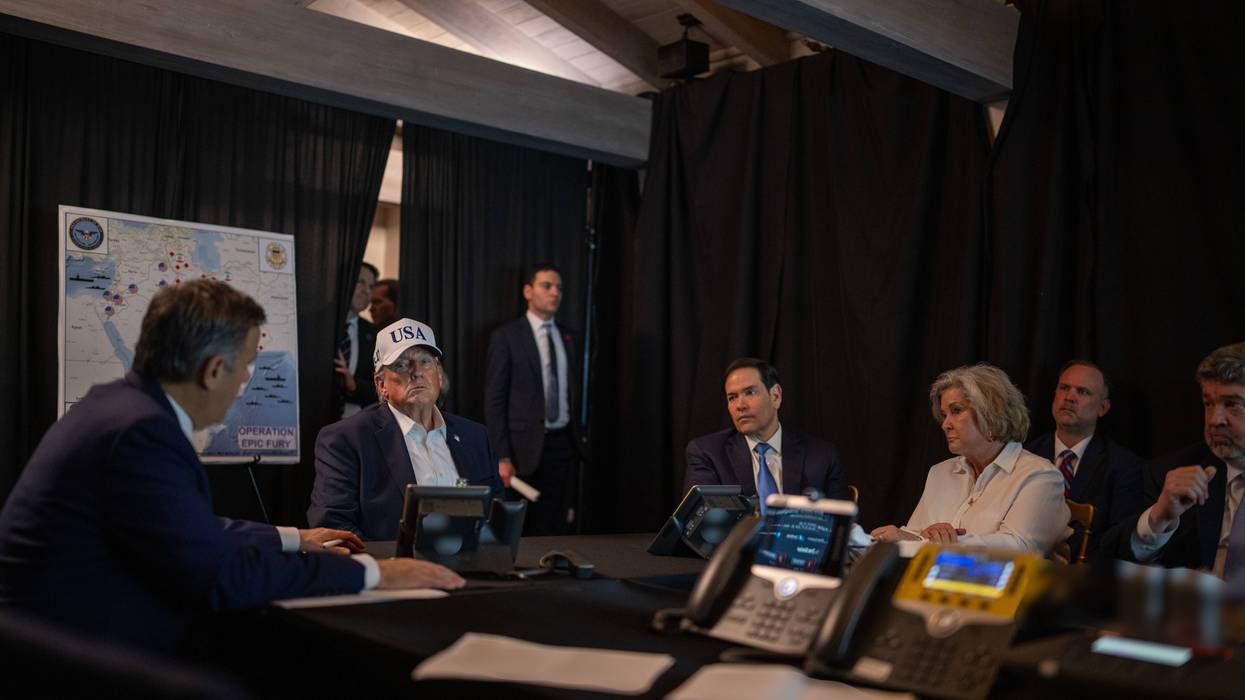November, 09 2022, 11:11am EDT

U.S. Carbon Offset Proposal Fails to Meet the Urgency of the Climate Crisis
Statement released by Rachel Cleetus, Union of Concerned Scientists
SHARM EL-SHEIK, Egypt
At this year's COP27 climate conference, U.S. Special Envoy John Kerry, along with foundation partners, announced a new voluntary carbon-market offset initiative intended to fund renewable energy projects, and the transition away from coal, in low- and middle-income countries. This proposal raises significant concerns and is no substitute for the real public finance that these countries need, according to the Union of Concerned Scientists (UCS).
Below is a statement by Rachel Cleetus, policy director and lead economist for the Climate and Energy Program at UCS.
"Carbon offsets are not an answer in a world already on fire, under water and facing mounting climate losses and damage. While the exact details are still unclear, the outlines of the US proposal are out of step with the science, which calls for steep, absolute emission reductions as soon as possible if we are to have any chance of meeting the goals of the Paris Agreement. The private sector can and must play an important role in tackling the climate crisis. However, a voluntary carbon credit program won't guarantee deep, real cuts in emissions--it's tantamount to rearranging the deck chairs as the climate ship is going down.
"Low- and middle-income countries need grants-based public finance from richer countries to help them quickly transition away from fossil fuels, alongside the rest of the world. That's what the U.S. must deliver, rather than questionable carbon offset schemes that risk allowing companies to pollute at the expense of the planet."
The Union of Concerned Scientists is the leading science-based nonprofit working for a healthy environment and a safer world. UCS combines independent scientific research and citizen action to develop innovative, practical solutions and to secure responsible changes in government policy, corporate practices, and consumer choices.
LATEST NEWS
Call Grows to Impeach Trump, 'The Most Dangerous Man on the Planet'
"Trump’s illegal war on Iran and the rule of law," said one pair of campaigners, "establish an intolerable pattern of egregious abuses of power, directly threatening our constitutional order, our safety, and our way of life."
Mar 02, 2026
After the unprovoked bombing of Iran over the weekend by the United States—strikes that included the unlawful assassination of Iranian Supreme Leader Ali Hosseini Khamenei—the call for US President Donald Trump to be impeached and removed from office has grown as the straightest path to hold the US leader to account for the attacks which policy and human rights experts have condemned as a serious war crime.
With a regional war in the Middle East that was already boiling from Gaza to Lebanon and from Syria to Yemen now exploding in the wake of the US-Israeli attacks on Iran, Globe and Mail columnist Debra Thompson on Sunday called Trump "the most dangerous man on the planet."
"Rather than ending wars," Thompson notes, "Trump has initiated military action eight times, carrying out attacks in seven countries (Syria, Iraq, Iran, Nigeria, Yemen, Somalia, and Venezuela) in 2025." Such a pattern of violence and warmongering should make clear that failure to restrain Trump has only emboldened him.
"The recurring danger in this latest presidential aggression is that there are no guardrails, no constraints, and no post-hoc justification," writes Thomson, "other than that Mr. Trump is the President of the United States and can do whatever he wants."
But American presidents cannot simply do whatever they want. According to a Reuters/Ipsos poll out Sunday, less than 25% support the president's aggression against Iran. In the first wave of the US military attack, an Iranian school for girls was bombed, killing over 108 civilians, mostly children.
While some congressional lawmakers are pushing for a vote this week on a War Powers Resolution to curtail US military operations against Iran, others are demanding more robust action from Congress to bring Trump's war-making to an end.
"Under Article I, Section 8 of the U.S. Constitution, only Congress has the power to declare war, as well as to raise and support armies, provide and maintain a navy, and fund and regulate the military," declared novelist and political activists Stephen King on Saturday. "Impeach the SOB."
Mike Hersh and Alan Minsky, respectively the communications director and executive director of the Progressive Democrats of America, argued in a Sunday op-ed for Common Dreams that "Trump's illegal, unconstitutional war on Iran is not only a moral and humanitarian disaster, but also a profound constitutional crisis."
According to Hersh and Minsky:
Trump’s illegal war on Iran and the rule of law establish an intolerable pattern of egregious abuses of power, directly threatening our constitutional order, our safety, and our way of life. These intertwined crises cry out for an immediate, decisive response by the Congress and the US public.
Therefore, PDA demands that all members of Congress, Democrats, Republicans, and Independents alike, uphold their oath of office to defend our constitutional republic. The Constitution offers one and only one remedy when President a repeatedly breaks the law and arrogantly refuses to abide by the limits on the power clearly laid out in the Constitution. That remedy is impeachment, followed by removal from office.
Matt Duss, executive vice president for the Center for International Policy, said that US lawmakers, as well as the American people they represent, "must also be ready to hold the president and his administration accountable for this breach of US and international law."
"The failure to hold past presidents liable for war crimes and related violations of our own laws has helped lead to this dangerous moment, with a seemingly unrestrained president endangering millions of lives with impunity," warned Duss. "The forever wars and the imperial presidency must finally come to an end.”
Keep ReadingShow Less
'Insane This Is Legal': Bettors Make Huge Profits From Suspiciously Timed Wagers on Iran War
"Reminder that Donald Trump Jr. sits on Polymarket's advisory board and his firm invested double-digit millions into the platform last year."
Mar 01, 2026
Bettors on the prediction platform Polymarket made a killing with suspiciously timed wagers that the United States would attack Iran by February 28, the day President Donald Trump announced a bombing campaign against the Middle East nation.
Bloomberg reported that six accounts on Polymarket, all newly created this month, "made around $1 million in profit" by betting on the timing of the US attack on Iran. The accounts, according to Bloomberg, "had only ever placed bets on when US strikes might occur," and "some of their shares were purchased, in some cases at roughly a dime apiece, hours before the first explosions were reported in Tehran."
One account with the name Magamyman raked in over $515,000 by betting roughly $87,000 that the "US strikes Iran by February 28, 2026."
The lucrative bets quickly drew scrutiny from lawmakers. US Sen. Chris Murphy (D-Conn.) wrote on social media that "it’s insane this is legal."
"People around Trump are profiting off war and death," Murphy alleged. "I’m introducing legislation ASAP to ban this."
Rep. Mike Levin (D-Calif.) wrote that "prediction markets cannot be a vehicle for profiting off advance knowledge of military action" and demanded "answers, transparency, and oversight."
"Reminder that Donald Trump Jr. sits on Polymarket's advisory board and his firm invested double-digit millions into the platform last year," Levin wrote, referring to the president's eldest son. "The [Justice Department] and [Commodity Futures Trading Commission] both had active investigations into Polymarket that were dropped after Trump took office."
There's no concrete evidence that Trump administration officials or staffers were behind the hugely profitable bets, but the wagers heightened concerns about the possibility of insider trading using increasingly popular prediction market platforms such as Polymarket and Kalshi. Last month, bettors used Polymarket to make big profits on suspiciously timed wagers on when the US would oust Venezuelan President Nicolás Maduro.
Polymarket currently allows users to bet on when Iran will have a new supreme leader, when the US and Iran will reach a ceasefire agreement, and when the US will invade Iran.
The celebrity news tabloid TMZ reported Saturday that "a group at a Washington, DC restaurant was talking openly in the bar area Friday afternoon about a national secret that was about to literally explode hours later—the bombing of Iran."
As journalist David Bernstein noted, that—if true—leaves open the possibility that "these 'insider' bets have been placed by any rich person with good ears in DC."
"Not to mention that for all we know these administration clowns were probably gossiping about it on a text chain with half a dozen people they accidentally invited," Bernstein added. "This is hardly the locked lips brigade we’re dealing with."
Keep ReadingShow Less
Experts Pillory Trump Case for War on Iran: 'Flimsiest Excuse for Initiating a Major Attack' in Decades
"What they posed as the threat they were trying to preempt—an attack by Iran against US forces—is so extremely implausible, it is also laughable," said one analyst.
Mar 01, 2026
Senior Trump administration officials attempted during a briefing with reporters on Saturday to make their case for the joint US-Israeli military assault on Iran that has so far killed hundreds and plunged the Middle East into chaos.
According to experts who listened to the briefing, which was conducted on background, the justification for war was incredibly weak. Daryl Kimball, president of the Arms Control Association, told Laura Rozen of the Diplomatic newsletter that the administration's argument was "the flimsiest excuse for initiating a major attack on another country without congressional authorization, in violation of the UN Charter, in many decades."
During his early Saturday remarks announcing the attacks, President Donald Trump claimed that "imminent threats from the Iranian regime" against "the American people" drove him to act. But Kimball said that administration officials "provided absolutely no evidence" to back that assertion during the briefing.
"What they posed as the threat they were trying to preempt—an attack by Iran against US forces—is so extremely implausible, it is also laughable," said Kimball.
Following the start of Saturday's assault, which Trump explicitly characterized as a war aimed at overthrowing the Iranian government, unnamed administration officials began leaking the claim that Trump feared an Iranian attack on the massive US military buildup in the Middle East, prompting him to greenlight the bombing campaign in coordination with Israel and with a nudge from Saudi Arabia.
Kimball, in a social media post, took members of the US media to task for echoing the administration's narrative. "Reporters need to do more than stenography," he wrote in response to Punchbowl's Jake Sherman.
"The American people were lied to about Iraq. The American people are being lied to again today—and once again, it is ordinary people who will pay the price."
Trump and top administration officials also repeated the longstanding claim from US warhawks that Iran is bent on developing a nuclear weapon, something Iranian leaders have publicly denied—including during recent diplomatic talks. Neither US intelligence assessments nor international nuclear watchdogs have produced evidence indicating that Iran is moving rapidly in the direction of nukes, as claimed by the administration.
Rozen noted that some remarks from administration officials during Saturday's briefing "suggested Trump’s negotiators"—a team that included Jared Kushner and Steve Witkoff—"may not have had the expertise or experience to understand the Iranian proposal to curb its nuclear program." Rozen reported that one administration official kept misstating the acronym for the International Atomic Energy Agency (IAEA), the UN nuclear watchdog.
Trump administration officials, according to Rozen, seemed astonished that Iranian negotiators would not accept the US offer to provide free nuclear fuel "forever" for Iran's peaceful energy development, viewing the rejection as a suspicious indication that Iran was opposed to a diplomatic resolution—even though, according to Oman's foreign minister, Iran had already made concessions that went well beyond the terms of the 2015 nuclear accord that Trump abandoned during his first stint in the White House.
Experts said it should be obvious—particularly given Trump's decision to ditch the previous nuclear accord—why Iran would not trust the US to stick by such a commitment.
The administration's inability to provide a coherent justification for war tracks with the rapidly shifting narrative preceding Saturday's strikes—an indication, according to some observers, that Trump had made the decision to attack Iran even in the face of diplomatic progress and left officials to try to cobble together a rationale after the fact.
In a lengthy social media post, Pentagon Secretary Pete Hegseth insisted war was necessary because Iran "refused to make a deal" and because the Iranian government "has targeted and killed Americans," hardly the claim of an imminent threat push by the president and other administration officials.
Brian Finucane, a senior adviser to the US Program at the International Crisis Group, noted in response that the Trump administration has "sidelined anyone who could articulate... a coherent argument, partly because expertise is deep state and woke and partly because they just don't care."
The result is another potentially catastrophic war that runs roughshod over US and international law, puts countless civilians at risk, and threatens to spark a region-wide conflict.
"President Trump, along with his right-wing extremist Israeli ally Benjamin Netanyahu, has begun an illegal, premeditated, and unconstitutional war," US Sen. Bernie Sanders (I-Vt.) said in a statement on Saturday. "Tragically, Trump is gambling with American lives and treasure to fulfill Netanyahu's decades-long ambition of dragging the United States into armed conflict with Iran."
"The American people were lied to about Vietnam. The American people were lied to about Iraq," Sanders added. "The American people are being lied to again today—and once again, it is ordinary people who will pay the price."
Keep ReadingShow Less
Most Popular


